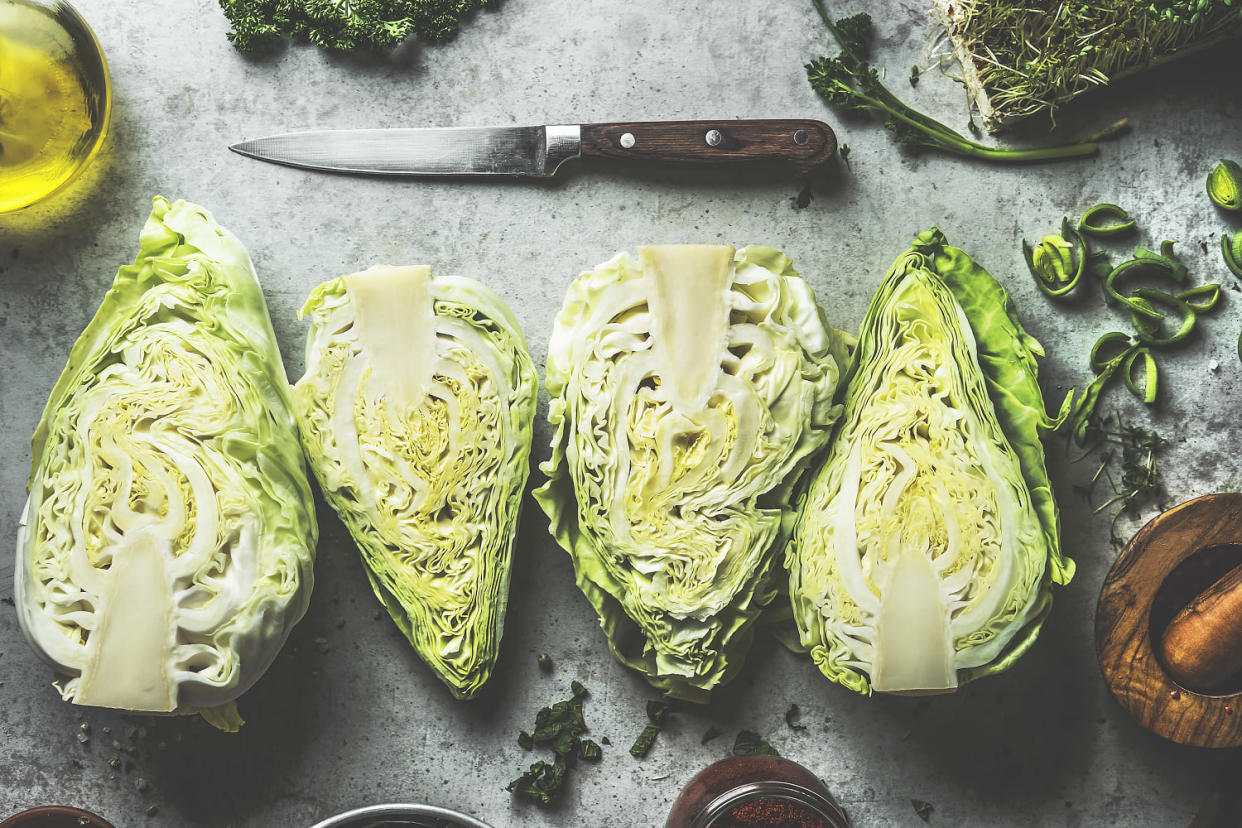Cabbage is making a comeback. Here's the best way to eat it

Cabbage is an affordable, crispy veggie that adds flavor and nutrition to any meal.
If cabbage is only on your menu as a slaw or on St. Patrick's Day, then you're missing out on the versatility of this green or purple vegetable.
Cabbage doesn't always take center stage, but varieties like Brussels sprouts and Napa cabbage have the cruciferous veggie more popular. And with good reason, since cabbage is a good source of fiber, vitamin C and vitamin K. Not to mention that cabbage is easy to ferment to turn into a good-for-the-gut sauerkraut or kimchi.
Learn the health benefits of cabbage, as well as some fun facts and recipes that should convince you to add it to your cart.
Cabbage nutrition facts
According to the U.S. Department of Agriculture, one cup of chopped cabbage has:
● 22 calories
● 1 gram protein
● 0 grams fat
● 5 grams carbohydrates
● 2 grams fiber (7% daily value (DV))
● 33 milligrams vitamin C (37% DV)
● 68 ug vitamin K (57% DV)
The health benefits of cabbage
Cabbage is an ancient vegetable that grows in more than 90 countries. It contains many nutrients, such as fiber, vitamin C and vitamin K, as well as antioxidant compounds, like myricetin, quercetin and polyphenols. Red cabbage contains anthocyanin, a plant compound that is frequently studied for its heart health benefits. One animal study found that red cabbage microgreens lowered LDL (bad) cholesterol levels in mice after eight weeks.
Cabbage is part of the cruciferous vegetable family, along with arugula, bok choy, Brussels sprouts, cauliflower, collard greens, kale, radishes, rutabaga, turnips and watercress. Research shows these nutrient-rich veggies may reduce mortality, depression and cancer risk.
According to the National Cancer Institute, cruciferous vegetables contain anticancer compounds, which are activated during chewing and digestion. In addition, various studies have shown an association between eating cabbage regularly and lower incidences of lung and breast cancer.
The bioactive compounds in cabbage have also been shown to be effective in nutritional therapy for type 2 diabetes. A review states that eating cabbage is associated with a lower risk of developing the disease, and it may reduce damage to organs affected by diabetes complications, such as the liver and kidney.
Are there drawbacks to eating cabbage?
The only downside to eating cabbage is that it may cause gas and bloating in some people. Cabbage contains a sugar called raffinose, which is left undigested until the bacteria in the gut ferment it. This fermentation can cause gas and bloating.
Cooked cabbage is more digestible, and eating it will probably result in less gas. Rather than boiling cabbage, which takes away the flavor, nutrients and crispiness, try blanching or roasting it to bring out the taste.
Fun facts about cabbage
These interesting tidbits are a few more reasons to add cabbage to your diet.
Fermented cabbage is good for the gut
Cabbage’s crispy texture makes it perfect for fermenting in a brine. Soaking cabbage in a salt brine encourages the growth of good bacteria, otherwise known as probiotics. It’s the starting point for both sauerkraut and kimchi, two tasty condiments that are chock full of probiotics. These critters flourish in the gut and contribute to a healthy microbiome, which is linked to many positive health aspects, like immunity and good mood.
It may help with mastitis pain
Mastitis is a painful inflammation of the breast tissue that may occur while breastfeeding. It’s also accompanied by fever, swelling and redness of the breast. Interestingly, some evidence suggests that laying cabbage leaves on inflamed breasts may alleviate pain. The science is spotty, but many moms swear by this therapy. Scientists don't know why this happens, but some believe it’s due to the cold nature of the cabbage leaves and the inflammation-fighting compounds in the veggie.
Cabbage juice was once thought to cure stomach ulcers
One study from the late 1940’s claimed that drinking cabbage juice rapidly cured stomach ulcers. For years, many people believed in this science and drank cabbage juice to cure their stomach ailments. Unfortunately, the science has not been validated with newer research, and many healthcare professionals recommend ulcer-fighting medications, rather than guzzling cabbage juice.
Healthy cabbage recipes
There are many creative ways to enjoy cabbage, from slaw to kimchi to wedges to salad. Here are some of our favorite cabbage recipes.
Kimchi Grilled Cheese by Amelia Rampe
Purple Coleslaw with Jalapeño and Pineapple by Matt Abdoo and Jeff Michner
Emi Boscamp's Peanut Butter and Kimchi (PB&K) Sandwich by Emi Boscamp
Fish Tacos with Cabbage Slaw and Crema by Will Gilson
Dilled Cabbage-and-Cucumber Slaw by Martha Stewart
Braised Cabbage and Carrots by Kwame Onwuachi
Bacon-Roasted Cabbage Wedges by Lauren Salkeld
Citrus Salmon Salad with Napa Cabbage by Melissa Clark
Caesar Salad-Style Cabbage by Andrew Carmellini
Pineapple Slaw with Toasted Walnuts by Wendy Bazilian
This article was originally published on TODAY.com
